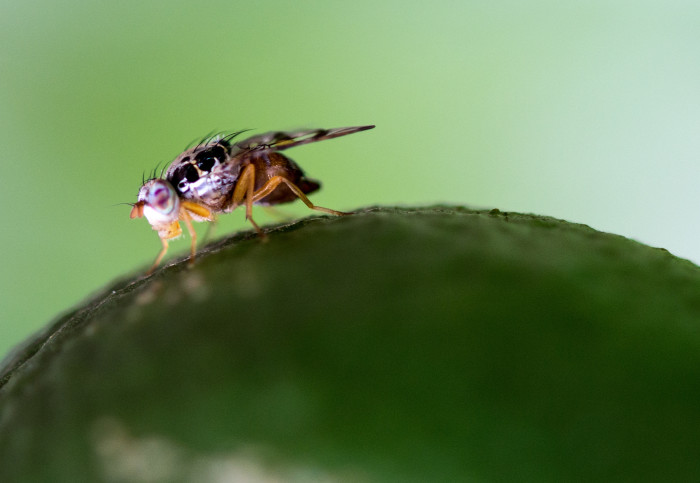Major fly pest genetically modified in the lab to produce more males

Mediterranean fruit flies, an agricultural pest, have been modified in a lab experiment so more males are born than females, reducing their numbers.
The experiments suggest that the modification could be developed for use in a range of other agricultural pest species, or insects that carry human diseases.
We need new technologies to fight these pests, and our modification could be one such tool. Dr Angela Meccariello
Agricultural pests like the Mediterranean fruit fly, or medfly (Ceratitis capitata), cause significant crop losses, so finding new ways to tackle infestations is crucial for feeding a growing global population.
The study, carried out by researchers at Imperial College London and the Hebrew University of Jerusalem, is published in BMC Biology.
Impacting global agriculture
It has been predicted that the world's population will increase to over nine billion people by 2050, and that global food production will need to increase by around 70 percent to match this rate of change.
Lead researcher Dr Angela Meccariello, from the Department of Life Sciences at Imperial, said: “Currently, medfly infestations are estimated to contribute towards a loss of up $298 US million annually due to crop damage across a wide geographic area and in over 250 different species of fruits and vegetables.
“Due to factors such as climate change, the spread of invasive species and pesticide resistance, there is potential for the negative impact of the medfly on global agriculture to increase if left unchecked. We therefore need new technologies to fight these pests, and our modification could be one such tool.”
The team’s modification works by using a DNA-cutting enzyme to destroy the X chromosome during the production of sperm, leading to predominantly male offspring, as females require two Xs. In their experiments, they managed to produce populations of the flies that were 80% male.
As well as leading to fewer flies overall as there are fewer mating opportunities, biasing the population towards males would have added benefits in the field. As part of the medfly life cycle, the females break the skin of fruit with a needle-like appendage called an ovipositor during the process of egg deposition, which causes a significant damage to the integrity of the fruit regardless of the viability of the deposited eggs.
Exciting and urgent challenge
The team’s work represents the first time a sex-distorting modification has been applied to a ‘non-model organism’. Model organisms are those that have been extensively studied and used in many experiments, so their biology is well characterised and findings using them are often thought to be applicable to a wide range of other organisms.
The genomes of non-model organisms are generally less well known, so the team will further study the genetics of the medfly to improve their modification. Although the end goal is to release these modified flies into local populations in areas where these flies are causing a problem for crops, the team say they first need to spend time further optimising the technology and ensuring any eventual use would not have unintended side effects and would be safe for release.
However, proving the technology can work on such a non-model organism also opens up the possibility of designing similar modifications for closely related pest species, such as other species of fruit flies.
Senior author Dr Nikolai Windbichler, from the Department of Life Sciences at Imperial, said: “Developing genetic rather than chemical approaches, as a species-specific and sustainable way to control agricultural pest insects, is an exciting and urgent challenge.
"In the present study we have also created a set of genetic tools for us or others to use and take the next steps in moving such technologies towards application.”
The research is funded by the Biotechnology and Biological Sciences Research Council.
-
‘Engineered sex ratio distortion by X-shredding in the global agricultural pest Ceratitis capitata’ by Angela Meccariello, Flavia Krsticevic, Rita Colonna, Giuseppe Del Corsano, Barbara Fasulo, Philippos Aris Papathanos and Nikolai Windbichler is published in BMC Biology.
Article supporters
Article text (excluding photos or graphics) © Imperial College London.
Photos and graphics subject to third party copyright used with permission or © Imperial College London.
Reporter
Hayley Dunning
Communications Division